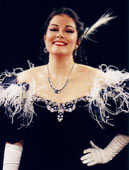

 |
 |
|
  Jennifer Larmore mezzo-soprano Bruce Ford tenor Antoine Palloc piano Queen Elisabeth Hall, London 19 May 2005 Songs and Duets by Donizetti, Mariani, Rossini, Verdi, Gabussi, Benedict, Pacini, Thomas, Belgiojoso, Gounod, Arditi & Mercadante An evening of song, gently suggesting Rossini's Samedi soirs in the Paris of the 1860s, their atmosphere hinted with comfortable armchair, flowers and decanter on a table, for these Opera Rara stars to listen to each other taking turns on stage. Live song recitals are completely different from experiencing the same music on CD; there is always an element of risk, and victory is not assured until after the last encore. The QEH audience was unexpectedly small (for bel canto operas these singers can fill the Royal Festival Hall), allowing some essential experimentation, as explained below. Bruce Ford launched into Donizetti's duet Love, voice of heaven robustly, his voice as heard from close by (Stalls row K), rough & inconsiderately overwhelming his lady partner. He went on to deliver solo songs by Mariani and Gomes charmlessly. Jennifer Larmore took over the stage, leaving the music stands and raising the temperature to enact the excitement of Rossini's Venice Regatta, with a kiss for the victorious gondolier. Bruce Ford brought a dark vision of Verdi's dark and silent tomb and plenty of rumbustious verve to Rossini's drunken Orgy, his characterful tenor now under good control. By the interval we were having a pleasant time, no more. Not sure if we'd stay to the end, we moved to the empty side front Terrace Stalls, where the sound was far better and all three musicians seemed more relaxed for their break; a common experience with singers. But the move was at a price - one characteristic of the South Bank Centre, and often rehearsed in these columns as well as by other critics. [q.v. extract below from "Let there be light"] In the impenetrable gloom imposed by the management it was totally impossible for most of the audience to read the texts, translations and interesting new commentaries (Gerald Larner and Opera Rara) provided in the £2.50 programme. (We have just returned from a festival in Germany, where the lights were never dimmed and we could comfortably read the bilingual texts without any loss of 'atmosphere'.) So another move further back was imperative, positioning myself under one the few lights sufficient to read. But there was a miracle, one recalled from years ago, before I was a regular reviewer. At the side of row G, the voices and piano came into ideal balance and accord, the sound there transformed and brought into focus, as with a perfectly adjusted camera. Antoine Palloc especially showed us his poise and versatility, far more now than a dutiful accompanist as at first. Yes, they were probably all singing and playing with greater freedom, but it was more than that. Reminding us that Rossini had enjoyed his sociable retirement in Paris, there were songs by Gounod and Ambroise Thomas, before a final glorious Rossini duet, Les amants de Séville. The audience was by now fully aroused and cheering. To bring us back home to London, each of the singers gave us an English encore. Bruce Ford took us to Suffolk and Britten's Foggy, foggy dew and Jennifer Larmore shared with us her secret desire in I want to be a Diva (from Victor Herbert's The Enchantress), a great double act with her pianist. By the end there was a warm feeling of communication between performers and audience; a CD signing session in the foyer afterwards would not have felt at all inappropriate as it so often seems after a 'serious' instrumental event.
With an inviting box nearly an inch thick, this is another of Opera Rara's bench-mark productions, with full documentation and texts, interesting essays, photos and background in a 100 page booklet. Enormously enjoyable; it will change your feeling about operatic recitals on CD, a genre I have tended to avoid [Opera Rara ORR231]. EXTRACT FROM "Let there be light" (Monteverdi): - - Many potential concert-goers are alienated by audience control effected by ancillary, and usually unidentified, 'experts' and 'event managers', who think they know what we like and need - - concert performances of operas in foreign languages are often given in relative darkness, leaving purchasers of expensive programmes to read them afterwards, and 'lighting designers' are as likely to cause somnolence as 'atmosphere' by their efforts; audiences are never asked whether they might prefer light to this sort of manipulation. - - Andrew Carwood's rehearsal with The Cardinals, in informal garb and normal lighting, had been infinitely more rewarding than the concert - - for the sacred music (which Carwood urged should be given in regular church services) there is no historical precedent for plunging congregations into darkness. Let there be light!
|